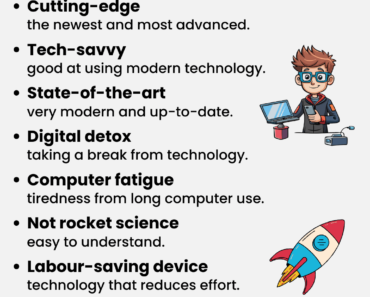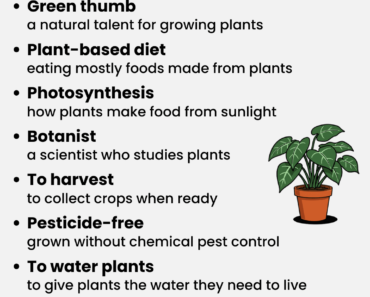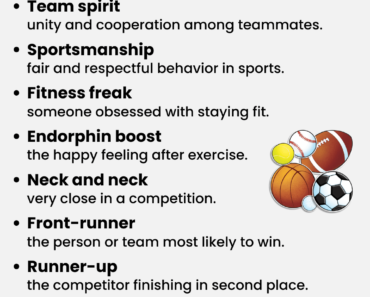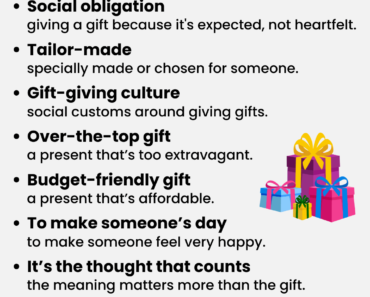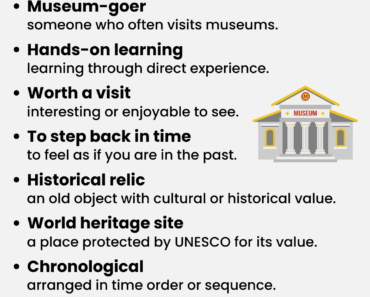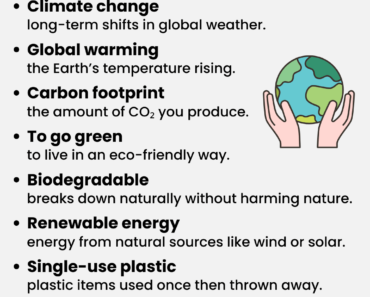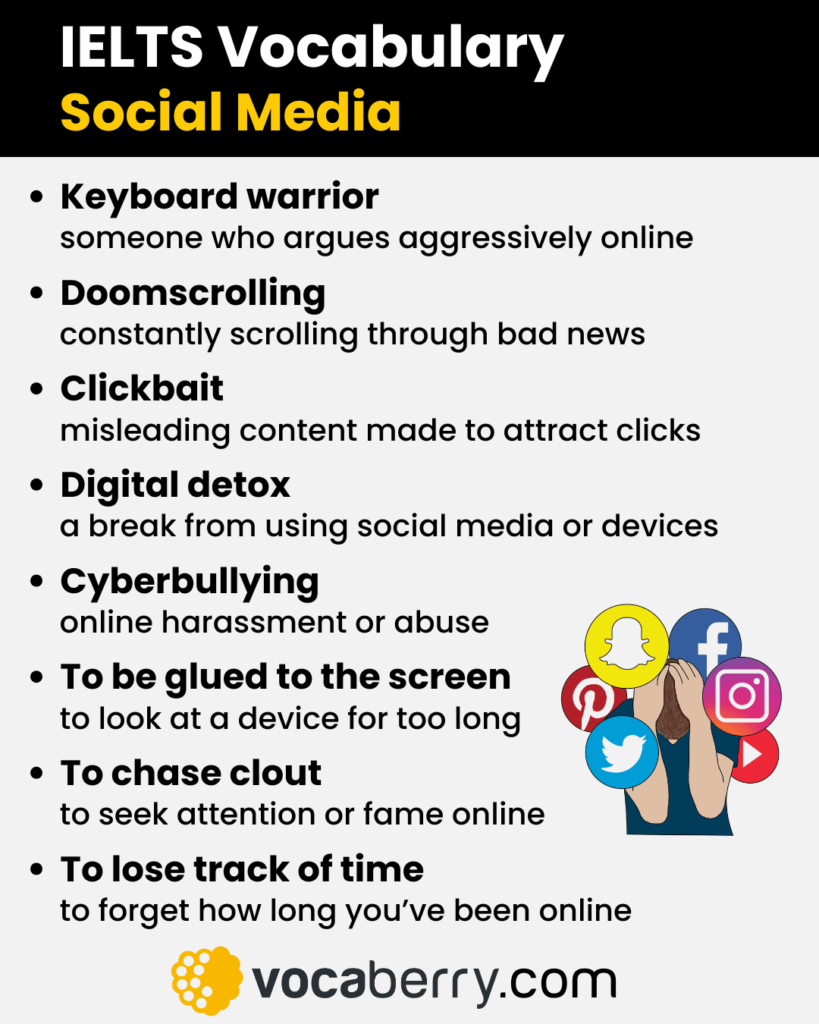
Social media is a common topic in the IELTS Speaking test. Examiners may ask you about how you use social media, how it influences communication and relationships, or its effects on daily life. In this guide, you’ll learn useful IELTS vocabulary for social media with clear definitions, followed by IELTS Speaking Part 1, Part 2, and Part 3 questions with sample answers.
IELTS Vocabulary for Social Media
Here is some useful IELTS vocabulary for talking about social media with clear definitions. These words and phrases will help you give better answers in the IELTS Speaking test.
- Social media platform – a website or app for sharing and connecting
- Content creator – someone who makes and shares online material
- To go viral – to become extremely popular online
- Influencer – someone who shapes opinions online
- Meme – a funny image or idea shared widely online
- Troll – someone who posts rude or hateful comments
- Hater – a person who criticizes others online
- Trending – being widely talked about on social media
- Streaming – watching or listening to online content in real time
- To scroll through – to move through posts or feeds
- To tag someone – to mention another user in a post
- To go live – to broadcast a live video
- To engage with content – to interact with likes, comments, or shares
- To follow trends – to keep up with popular online topics
- To share moments – to post personal updates or experiences
- To stay connected – to keep in touch online
- To go offline – to stop using social media for a while
- To protect personal data – to keep private information safe online
- Time-consuming – taking a lot of time to do
- Online engagement – online activity and participation
- Digital footprint – the data you leave online
- Online presence – how you appear on the internet
- Engagement rate – how much people interact with a post
- To raise awareness – to inform people online about an issue
- To go on a digital detox – to take a break from social media
- To promote a product – to advertise something online
- Sponsored post – paid content shared by an influencer
- To build a brand – to create a strong online image
- To go trending – to become widely discussed online
- Viral challenge – a popular online activity spreading fast
- To spread misinformation – to share false information
- Fake news – false or misleading online stories
- Echo chamber – an online space with similar opinions
- Cancel culture – rejecting someone for offensive actions
- Filter bubble – seeing only content that matches your views
- To scroll mindlessly – to browse online without thinking
- To overshare – to post too much personal info
- Cyberbullying – online harassment or abuse
- Social media addiction – being unable to stop using social media
- Algorithm – the system deciding what you see online
- Influencer marketing – brands promoting through influencers
- To monetize content – to earn money from online posts
- Online community – a group with shared online interests
- To curate content – to carefully select what you share
- To slide into DMs – to send a private message
- To spark engagement – to create online interaction
- To go down a rabbit hole – to spend too long exploring online
- To jump on the bandwagon – to join a popular trend
- User-generated content – posts made by users, not brands
- To clap back – to respond sharply to criticism
- To manage your online image – to control how others see you online
- Digital influencer economy – business based on social media influence
- Clickbait – misleading content made to attract attention
- Data privacy – protection of personal information online
- Phishing – tricking people into sharing private data
- Technological dependency – over-reliance on digital devices
- Online regulation – laws controlling digital activity
- Digital divide – the gap between those with and without internet access
- To chase clout – to seek attention or fame on social media
- Cyber harassment – bullying or threatening behavior on the internet
- Niche audience – a small, targeted group of followers
- Screen time – the amount of time spent using devices
- Doomscrolling – constantly scrolling through negative news or posts
- To disconnect from the digital world – to take a break from screens
- Digital wellbeing – staying mentally healthy while using technology
- Online persona – the image you present on the internet
- Virtual friends – people you only know through the internet
- Sensationalism – exaggerating stories to attract attention
- Alternative media – non-mainstream online news sources
- Hate speech – language that attacks or insults a group
- Freedom of speech – the right to express opinions openly
- Catfishing – pretending to be someone else online
- Derogatory comments – insulting or disrespectful remarks
- Online activism – promoting causes or change on the internet
- Keyboard warrior – someone who argues aggressively online
- FOMO (Fear of Missing Out) – anxiety about missing online updates
- Manipulation – influencing others dishonestly for control
- Killing time – doing something just to pass time
- Hooked on something – very interested or addicted to something
- To spread the word – to share news or information online
- To lose track of time – to forget how long you’ve been online
- To while away the hours – to spend time doing something unproductive
- To be glued to the screen – to look at a device for too long
IELTS Speaking: Social Media Questions & Answers
In this section, you’ll find IELTS Speaking Part 1, Part 2, and Part 3 questions on social media with sample answers. These examples show how the social media vocabulary can be used in your responses during the test.
IELTS Speaking Part 1 – Social Media
Do you use social media?
Yes, I use a few social media platforms almost every day to stay connected with my friends and family. It’s a quick way to share updates or photos and keep in touch with people who live far away. Still, I try not to scroll mindlessly, because it can easily affect my digital wellbeing.
What social media apps do you use most?
I mostly use Instagram and YouTube. I like Instagram for following trends and watching stories, while YouTube helps me learn new things and relax after work. I also enjoy discovering new content creators who share useful or inspiring content.
How much time do you spend on social media each day?
Usually around two to three hours, depending on the day. Sometimes I completely lose track of time when watching videos or reading comments. That’s why I occasionally take a short digital detox just to focus on other activities and clear my mind.
Do you follow any famous people online?
Yes, I follow a few influencers who use their online presence to spread positive messages. Some talk about fitness and mental health, while others promote products they truly believe in. I try to avoid those who just chase clout for attention.
What are the disadvantages of social media?
There are quite a few. It can be time-consuming and even addictive for some people. I’ve also seen a lot of fake news and cyberbullying online, which can seriously harm people’s confidence and mental health.
IELTS Speaking Part 2 – Social Media Cue Card
Describe a social media platform or app you use frequently.
You should say:
- What it is
- How often you use it
- What you use it for
- And explain why it is important to you
Sample Answer:
One social media platform I use quite often is Instagram, which has become an essential part of my daily routine. It’s one of the most popular social media platforms where people share moments, post pictures, and engage with content through likes, comments, or stories. I’ve been using it for several years now, and it’s honestly hard to imagine a week without checking it.
I usually spend around an hour a day on it, though sometimes I lose track of time while scrolling through posts or watching short videos. I mostly use it to stay connected with my friends, follow travel pages, and discover new content creators or influencers who post about lifestyle, photography, and personal growth. Occasionally, I also use it to raise awareness about environmental issues or share motivational quotes that might inspire others.
What I really like about Instagram is how interactive it is. You can go live, tag someone, or even follow trends to keep up with what’s happening globally. I also enjoy the creative side of it, for instance, people can design posts, edit videos, and express their personalities in different ways. However, I try not to scroll mindlessly or spend too much screen time, because social media can easily become time-consuming and even addictive.
Another thing I appreciate is that it gives ordinary people a chance to build something meaningful. Many have managed to build a brand, promote products, or even monetize content through their online presence. Personally, I don’t post that often, but I do enjoy watching trending videos and seeing how others use the platform creatively.
That being said, I’m also aware of its downsides. Sometimes, people become too focused on likes and followers, which can lead to social media addiction or a distorted sense of reality. I try to manage my digital wellbeing by setting limits and occasionally taking a digital detox. Despite its flaws, Instagram remains an amazing tool for online engagement and self-expression. It allows me to connect with people who share similar interests, and that’s what makes it such an important part of my life.
IELTS Speaking Part 3 – Social Media Discussion
IELTS Speaking Part 3 questions about social media often ask you to compare online and real-life communication, discuss its effects on society, and share your views on topics like privacy, digital trends, and how technology shapes human connection.
How has social media changed the way people communicate?
Social media has completely revolutionized communication. Instead of talking face-to-face, people now interact through comments, stories, or private messages. It helps us stay connected across distances, but it has also made conversations less genuine. Many people tend to scroll mindlessly or use emojis instead of real words. On the positive side, platforms allow us to share moments, follow trends, and even raise awareness about social issues. However, the constant screen time and lack of emotional depth can sometimes weaken real-world relationships.
What are the main disadvantages of using social media?
One big problem is how time-consuming it can be. People often lose track of time while doomscrolling through negative posts or comparing their lives with others. It can lead to FOMO, anxiety, or even social media addiction. There’s also the issue of fake news and misinformation, which spread so easily through clickbait and sensational headlines. Some users face cyberbullying or derogatory comments, which affect their digital wellbeing. While social media connects us globally, it also creates filter bubbles that limit how we see the world.
Why do people care so much about likes and followers?
People crave validation online. Getting likes and followers gives them a sense of popularity and self-worth. For content creators or influencers, it directly affects their engagement rate and ability to monetize content through sponsored posts or influencer marketing. However, it’s easy to become a clout chaser, posting just to gain attention. This culture often leads to manipulation and a focus on numbers rather than authenticity. I think social media has turned into a place where approval often matters more than genuine connection.
How do influencers affect people’s choices and opinions?
Influencers play a huge role in shaping people’s behavior. Through influencer marketing and sponsored posts, they can promote products and build brands effortlessly. Their lifestyle often seems aspirational, which makes followers want to imitate them. However, some influencers overshare or promote things just for profit, leading to manipulating consumers. The digital influencer economy has blurred the line between honest recommendation and advertisement. Still, when influencers act responsibly, they can raise awareness and inspire people positively.
More IELTS Vocabulary Topics
If you found this lesson useful, explore other IELTS Speaking topics to expand your vocabulary and practice with sample answers:
- IELTS Vocabulary: Accommodation
- IELTS Vocabulary: Advertisement
- IELTS Vocabulary: Animals
- IELTS Vocabulary: Art
- IELTS Vocabulary: Artificial Intelligence
- IELTS Vocabulary: Books
- IELTS Vocabulary: Childhood
- IELTS Vocabulary: Crime and Punishment
- IELTS Vocabulary: Culture and Traditions
- IELTS Vocabulary: Daily Routine
- IELTS Vocabulary: Education
- IELTS Vocabulary: Environment
- IELTS Vocabulary: Family
- IELTS Vocabulary: Fashion and Clothes
- IELTS Vocabulary: Films
- IELTS Vocabulary: Food & Diet
- IELTS Vocabulary: Friends
- IELTS Vocabulary: Gifts
- IELTS Vocabulary: Health
- IELTS Vocabulary: Hobbies
- IELTS Vocabulary: Hometown
- IELTS Vocabulary: Money
- IELTS Vocabulary: Museums
- IELTS Vocabulary: Music
- IELTS Vocabulary: Plants
- IELTS Vocabulary: Shopping
- IELTS Vocabulary: Sports
- IELTS Vocabulary: Technology
- IELTS Vocabulary: Transport
- IELTS Vocabulary: Travel
- IELTS Vocabulary: Weather
- IELTS Vocabulary: Work & Jobs

